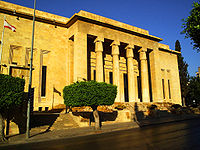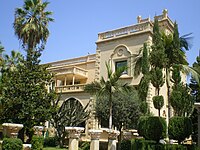| Beirut Beyrouth بيروت Bayrūt | ||
 | ||
Coat of arms and flag  | ||
| State | Lebanon | |
|---|---|---|
| Inhabitants | 2.076.822 (2013) | |
| Prefix tel | 961 01 | |
| Time zone | UTC 2 | |
Position
| ||
| Institutional website | ||
Beirut (بيروت, Bayrut, in FrenchBeyrouth) is the capital of Lebanon.
To know
Geographical notes
The city is located on a relatively small promontory jutting out into the eastern Mediterranean. It is by far the largest city in Lebanon. Due to the small size of the country, the capital has always maintained the status of the country's only true cosmopolitan city and, since independence, has been the commercial and financial center of Lebanon.
When to go
Beirut enjoys a Mediterranean climate. Come from April to June for warm, dry days and long, cool (19-25 ° C) evenings. Temperatures in July and August soar to around 30 ° C and the humidity can be a bit oppressive - make sure your hotel has air conditioning. The wettest months are December to February, so bring a good coat, wellington boots and an umbrella as rain often comes with torrential downpours. The roads have poor drainage and can quickly turn into rivers, so waterproof boots are highly recommended for the rainy season. Lebanon's ski season runs from December until early April.
Although the climate is varied and changes considerably according to the season, the weather is very predictable; weather forecasts on radio and TV stations are usually very accurate, so you shouldn't be unprepared for a sudden thunderstorm in the winter months.
Background
Beirut has survived a difficult history, falling under the occupation of one empire after another. Originally called Bêrūt, "Le muras" from the Phoenicians, the history of Beirut dates back to more than 5000 years ago. Excavations in the city center have unearthed layers of Phoenician, Hellenistic, Roman, Arab and Ottoman civilizations.
After World War II, Lebanon gained independence from France and Beirut became its capital in 1943: Bishara al-Khuri is Riyad al-Sulh, the first president and prime minister of Lebanon, are considered the founders of the modern Republic of Lebanon and national heroes. Beirut thrived as an important commercial and tourist center of the Middle East. It was a major destination among wealthy Arabs and European tourists, thanks to the unique geography, climate, diverse culture and freedom. Beirut was seen as the "European gateway to the Middle East" and vice versa, and was often called the "Paris of the Middle East".
It houses more than 10 recognized religious sects. Religious tension between the Christian and Muslim factions has sparked a brutal one civil war in 1975. The conflict lasted almost a decade and a half, devastating the city. The central area, previously the hub of much of the commercial and cultural activity, became a no-man's land. During the war, the city was divided between the Muslim west and the Christian east, and tensions between the different sects still remain today.
Since the end of the war in 1989, the Lebanese people have been rebuilding the capital. The city has embarked on an aggressive reconstruction policy. The city is thus working hard to regain its status as a tourist, cultural and intellectual center in the Middle East which it has lost to the Cairo, as well as a center for commerce, fashion and media dominated today by Dubai and from other wealthy states of the Gulf.
On 4 August 2020, two very violent explosions took place in the city near the port, causing over 220 deaths and 7000 injuries. The cause was attributed to the explosion of an ammonium nitrate deposit of over 2750 tons which occurred due to a fire. However, the entire city suffered extensive damage.
How to orient yourself

Beirut is made up of many different neighborhoods, each with their own atmosphere and distinctive character. Damascus Road, which connects downtown with the National Museum, was known as the "Green Line" during the Civil War era (1975-1990). At that time, it separated the predominantly Muslim western sector of the city and the eastern Christian sector.
Martyrs' Square and the postwar development of Beirut's Central District (BCD) are the geographic hub of the city and serve well enough for orientation. The city extends over a peninsula with the sea to the north and west and the ridge of Mount Lebanon to the east.
Some areas of Beirut have a friendly atmosphere and some of Beirut have a reputation for being very sociable and outgoing. Locals are used to seeing foreigners and would be happy to show you the city if you ask them.
Neighborhoods
- Center - The center of Beirut extends around Nejmeh and Martyrs' squares
- Gemmayzeh, east of Piazza dei Martiri is a trendy area that extends over what was once the green line that separated the Christian neighborhoods to the east from the Muslim ones to the west.
- Achrafieh, the Christian quarter, one of the best known in the city, extends even further east on the slopes of a hill. Today it is best known for its nightlife and is one of the oldest neighborhoods in Beirut. It is located on a hill in the eastern part of the city. Achrafieh is both a residential and commercial district; the historic core is characterized by narrow winding streets with ancient buildings, but large modern areas host banks, offices and shopping centers.
How to get
By plane
- MEA (Middle East Airlines) flies from Milan-Malpensa e Rome-Fiumicino
- Alitalia From Rome-Fiumicino
- Bulgaria Air - With a stopover in Sofia
- Wizz Air - With a stopover in Sofia
- Beirut International Airport
How to get around
What see

- [link not working]Beirut National Museum.
 Hours: From Tuesday to Sunday. from 09:00 to 17:00. Closed Mon and Holidays. The collections are exhibited in chronological order and range from the prehistoric period to that of the Mamluks dominion. During the civil war the museum came to be on the front line (Green Line) The building suffered considerable damage but the collections were saved. The most interesting pieces are statuettes from the Phoenician period discovered in Byblos.
Hours: From Tuesday to Sunday. from 09:00 to 17:00. Closed Mon and Holidays. The collections are exhibited in chronological order and range from the prehistoric period to that of the Mamluks dominion. During the civil war the museum came to be on the front line (Green Line) The building suffered considerable damage but the collections were saved. The most interesting pieces are statuettes from the Phoenician period discovered in Byblos. - American University Museum.
 From Mon to Fri 10: 00-16: 00. Established in 1867, the American University Museum holds very large collections of ceramic vases some of which come from Cyprus and date back to the Bronze Age.
From Mon to Fri 10: 00-16: 00. Established in 1867, the American University Museum holds very large collections of ceramic vases some of which come from Cyprus and date back to the Bronze Age.

.jpg/200px-Beirut,_Mohammed_al-Amin_Mosque_(6822615915).jpg)
- Mohammad Al-Amin Mosque. Inaugurated in 2008, the huge mosque that dominates the central square of the Martyrs is the work of the architect Azmi Fakhur who was inspired by Ottoman art and in particular by the Sultan Ahmed mosque in Istanbul as the blue domes denote and how he himself he has declared. The mosque was commissioned by the then Prime Minister Rafik Hariri who is buried here.
- Al Omari Mosque. From the 12th century, the Al Omari mosque was built by the Crusaders as a church dedicated to St. John the Baptist. It was converted into a mosque in the time of the Mamluks
- Maronite Cathedral of St. George. Devastated by the civil war, the Cathedral of San Giorgio has been restored but the marks of the bullets are still visible
- Maghen Abraham Synagogue. Abandoned during the years of the civil war, the synagogue is currently (year 2010) closed for restoration.


- Sursok Museum (Achrafieh neighborhood). The museum is housed in the mansion of Nicolas Sursock, a member of one of Beirut's most prominent families and a passionate collector of art objects. In accordance with his will, the villa was set up as a museum after his death in 1960. His portrait is exhibited in the museum. A new wing is currently under construction (2010) and is scheduled to open in 2012
- Robert Mouawad private museum, Army road - zokak el blat, ☎ 961 1 98 09 70, fax: 961 1 976027. The museum displays art objects such as jewelry, watches, porcelain and paintings that belonged to Robert Mouawad, a jeweler and collector from Beirut
Events and parties
What to do
Shopping
How to have fun
Most Beirut residents like to go out. If (and when) you go out in the evening, depending on the location, dress well as it will surely earn you some respect. Locals like to see foreigners go out of their way to fit in. Expect to be offered a drink or a cigarette. Alcohol is very cheap in shops and supermarkets, but in nightclubs the prices can go up to European standards (e.g. LL8.000 / beer, LL15.000 / cocktail).
Night clubs
- Skybar. Opened in 2003, the Skybar is located on the terrace of the Hotel Palm Beach and is divided into 3 levels
Where to eat
- 1 [link not working]باي روك (Bay Rock), ☎ 961 1 796700.
- 2 Al Dar, ☎ 961 1 867104.
Where stay
Moderate prices
- [link not working]Al Nazih guesthouse, Bld. 3, Rue 62 Chanty, Secteur 29, Gemmayze (Between Piazza dei Martiri and the Charles Hellou bus terminal), ☎ 961 1 564868, 961 3 475136 (mobile phone), fax: 961 1 564868, @[email protected].
 $ 15-90 depending on the type of room and the season. Services included: satellite TV, Internet connection, international calls.
$ 15-90 depending on the type of room and the season. Services included: satellite TV, Internet connection, international calls. - 1 Talal's New Hotel, Charles Helou, ☎ 961 1 562567. The rooms have satellite TV. Possibility to sleep on the terrace of the hotel with other travelers. (You will be given a mattress)
High prices
- Hotel the hotel, Rue Abdel Wahab el-Ingliz.
Safety
How to keep in touch
Keep informed
- Beirut.com - A newspaper in English
Around
Useful information
Sectarianism is still prevalent, as a result of the French colonial legacy of the divide et impera, which leads some Christian Lebanese to culturally identify with Europeans, especially the French, and some deny Arab identity altogether; preferring to identify as Phoenicians (referring to their ancestral roots in ancient Phenicia). Many Lebanese Muslims identify culturally and ethnically with other Arabs and Muslims of the Middle East.
It is helpful to show some basic courtesies. A simple one Bonjour when you walk into a bar or shop it can work wonders and may even get you a special fare, or when you get into a taxi, it may simply prevent the driver from giving you additional fares. To say Goods when something is given or offered, and if you prefer not to accept, then say La'a merci and smile; otherwise you might be considered rude, even if you are not.
Smoking is very common in Beirut, most people smoke both outdoors and indoors. However, most restaurants and bars comply with the law that prohibits smoking indoors.

